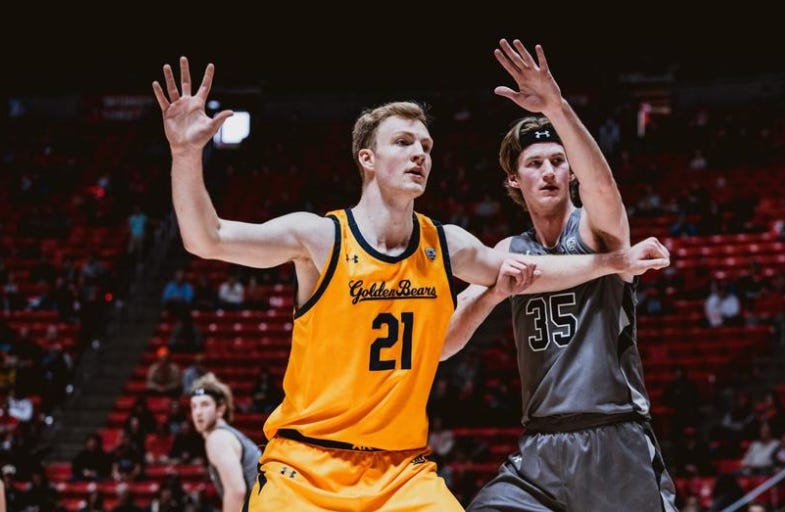Men's College Basketball: Cal vs. Utah Post-Game Thoughts
No sense of urgency at critical junctions
It was hard to pick something out to write about Sunday’s loss to Utah. I watched the replay a couple times. There weren’t any horrible misplays by Cal to break down and analyze. Sure, there were mistakes on a few defensive rotations, and a couple bad passes on offense. In general, it looked like Cal was able to execute what they wanted to execute.
This game followed almost the exact same script as Thursday night’s loss to Colorado. Kuany and the rest of the Bears are aggressive on offense attacking the lanes and being given free reign to shoot. At the halfway point of the first half of both games;
- 9:03 remaining, 16-10 Cal leads Colorado. Balanced scoring from the wings.
- 9:31 remaining, 15-11 Cal leads Utah. Kuany has 6 early points and is in attack mode.
Against the Utes, Cal would extend the lead to 18-11. Utah then answered with an 11-point run and grab the lead at 22-18 before Cal would score another bucket. Utah led 29-24 at halftime. While the Utes had all the momentum, the game was still up for grabs. Here’s the halftime stats.
Theimann and Kuany had 15 points, on combined 7-12 shooting. Lars had several good plays down low, and Kuany was a dual inside-out threat throughout the first half. The combined foursome of Alijiki, Newell, Roberson and Bowser were 1-9 combined. Again, the shot selections were decent, but they just weren’t connecting.
What’s jumped out at me for the past few games is the lack of urgency at crucial moments. Nick wrote extensively about Cal’s lack of clock management at the end of Thursday’s Colorado game. Cal had closed the gap to single digits, and there were opportunities for Cal to play aggressively and earn a few more possessions. Instead, Cal let Colorado eat up the clock, and Cal ran out of opportunities.
On Sunday, the second half starts with Utah leading 29-24. The game is within reach. Cal is outscored 12-1 during the first 6 minutes of the half, and is down 41-25 at the 14:08 mark. The final outcome is never in doubt.
During this stretch, Cal did not call a timeout to break the momentum. At the 16-minute TV timeout, Coach Fox subbed out all 5 players. During this stretch, Cal missed all 7 shots from the field, and committed 4 fouls.
Like at the end of the Colorado game, there was an opportunity to do something different. In his postgame comments, Coach Fox said, “I don’t want to take anything away from Utah’s team because statistically they’re one of the best defenses in the country. We had a couple of shots that just didn’t go – quite honestly, we had some shots that we’d take every time – but we had a very poor start to the second half.”
He is not wrong. Of those 7 misses, 4 came from wing players, and 3 from frontline players. Everyone was missing their shots, including Lars missing a gimme putback dunk. But, there were no strategic changes made during those 6 minutes. It is a bit simplistic to say “Do something different”, but even a timeout or more liberal substitutions could’ve changed the rhythm and energy during that stretch.
In the second half, Kuany and Thiemann attempted only 9 shots (made 3). The wing player foursome mentioned earlier attempted 14 (also making only 3). Sam Alijiki was trying to force it. He had several difficult shots and finish 0-7 for the half. I understand telling Grant, Sam and crew to keep on shooting - some will fall. But when it’s not working, the flow needs to revert to Lars low-post plays and Kuany motion - the same sets that worked in the first half.
Certainly, injuries and lack of depth factor into reasonable starts and fizzled endings. In similar circumstances, other teams have managed OK. John Canzano pointed out today that Cal is not the most-injured P12 team this season. Oregon has lost more player minutes than Cal has. The fact that the Bears lack the resources and coaching expertise to be able to work through these challenges is not an indictment of the current team. It is an indictment of the program and athletic department’s unwillingness or inability to make meaningful changes. Like the lategame scenarios in the last couple games, AD Knowlton is at a critical juncture where inaction is the worst possible choice. Does he and the administration they have the imagination and desire to try something different?




Thanks BP! Good stuff my friend.
"AD Knowlton is at a critical juncture where inaction is the worst possible choice"
Turns out it was Knowlton himself who was the worst possible choice.